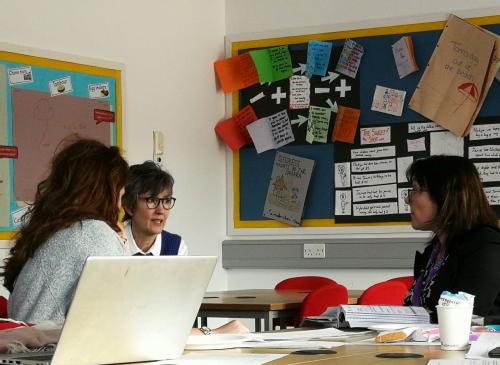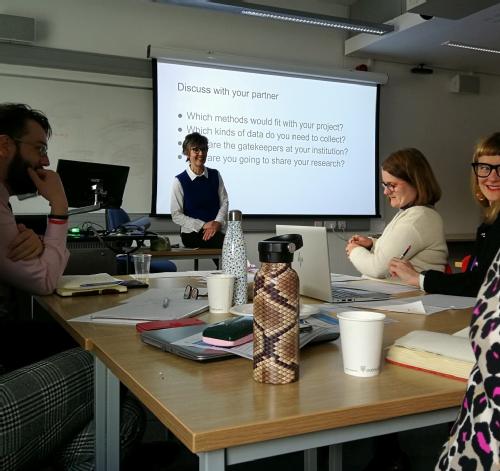Professional Development
Dr. Claire Tyson and Emma Taylor - 'Inhabiting the Third Space as a Teacher Researcher'.
See below an in-depth discussion between between Dr. Claire Tyson and Emma Taylor about their own personal approaches to professionally developing their teacher-researcher roles and how it fits within the 10 arches outlined in Carol Gray’s 'bridge model'.
Works Cited:
- Gray, C. (2013) Bridging the teacher/researcher divide: Master’s-level work in initial teacher education. European Journal of Teacher Education. 36(1), p. 24-38.
- Johnson R.B., and A.J. Onwuegbuzie (2004) Mixed Methods Research: A Research Paradigm Whose Time Has Come. Educational Researcher. 33(7),p. 14-26.
- Parsons, S. (2021) The importance of collaboration for knowledge co-construction in ‘close-to-practice’ research. British Educational Research Journal. 47(6), p.1490-1499.
- LeFrançois, B.A . and V. Coppock (2014). Psychiatrised children and their rights: Starting the conversation. Children & Society. 28(3), p.165-171.
‘The Role of a Teacher Researcher’ Workshop - 08/04/22
We proudly welcomed Dr Tyson onto campus to discuss with the 2022/23 teacher-researchers the barriers and facilitators to developing a Teacher Researcher role.


Further Reading:
University College School (UCS) Research Review #1Link opens in a new window
Chartered College of Teaching Impact JournalLink opens in a new window
BERA - Teacher Education and Development SIG (Special Interest Group)Link opens in a new window
BERA - 'Do It Yourself' Professional Development (DIY PD) by Richard HolmeLink opens in a new window
Interested in documenting your processes and experiences as a Teacher-researcher?
Why not then contribute towards the WJETT (Warwick Journal of Education – Transforming Teaching) blog? In June 2017, the Warwick Centre for Teacher Education (CTE) launched a new journal for teachers, researchers, and academics: The Warwick Journal of Education – Transforming Teaching (WJETT):
“Our new journal is aimed at an audience of teachers and school leaders with a view to bridging the gap between academic researchers and practitioners at the chalk-face. It aims to deliver innovative and creative teaching, alongside intellectual discussion on a range of educational issues – all in an accessible fashion that we hope will be thought-provoking for the practising teacher" - John Thornby (Editor-in-Chief of WJETT)
Previous WJETT blog entries can be viewed hereLink opens in a new window.
On Twitter? Be sure to follow the CTE (@warwickCTE) or WJETT blog (@WJETTblog).Aims and scope
The Warwick Journal of Education – Transforming Teaching aims to bring together educational research and practice in order to explore innovative, creative and evidence-informed pedagogies. It seeks to publish scholarly work that critically examines the values, theories, approaches and practices of education and in ways which remain accessible to a non-academic audience. WJETT offers a platform for the dissemination of good practice, offering opportunities for teachers and senior leaders to share their work, to document their investigations into teaching, learning and assessment, and to critically reflect upon their practice and identity as educators.
The term “teaching” is taken in its broadest sense, encompassing a variety of contexts, roles and practices. Education occurs not only in schools, colleges and universities, but also nurseries, workplaces, pupil referral units, faith organisations and professional and subject associations. It is created and developed by diverse communities of teachers, teaching assistants, lecturers, lab technicians, librarians, mentors and students. As such, WJETT invites contributions from all those working within any sector of education and from all educational communities.
We encourage methodological diversity, and welcome submissions from all disciplines, research traditions, and perspectives. This includes (but is not limited to) practitioner research; large-scale, whole-school or institutional initiatives; case studies; critical reflections, as well as issues relating to educational leadership, professional development and teacher education.
WJETT focuses upon transforming teaching, and contributions should clearly identify an aspect of transformation, either by evidencing positive change, exploring the processes of change, or viewing transformation of practice through a theoretical, critical or reflective lens.
